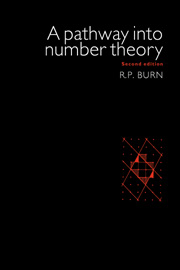Book contents
- Frontmatter
- Contents
- Preface to the second edition
- Introduction
- 1 The fundamental theorem of arithmetic
- 2 Modular addition and Euler's ɸ function
- 3 Modular multiplication
- 4 Quadratic residues
- 5 The equation xn + yn = zn, for n = 2, 3, 4
- 6 Sums of squares
- 7 Partitions
- 8 Quadratic forms
- 9 Geometry of numbers
- 10 Continued fractions
- 11 Approximation of irrationals by rationals
- Bibliography
- Index
- Frontmatter
- Contents
- Preface to the second edition
- Introduction
- 1 The fundamental theorem of arithmetic
- 2 Modular addition and Euler's ɸ function
- 3 Modular multiplication
- 4 Quadratic residues
- 5 The equation xn + yn = zn, for n = 2, 3, 4
- 6 Sums of squares
- 7 Partitions
- 8 Quadratic forms
- 9 Geometry of numbers
- 10 Continued fractions
- 11 Approximation of irrationals by rationals
- Bibliography
- Index
Summary
Sums of two squares
1 Determine the positions in table 1.1 of the integers less than 100 which appear in table 5.1.
2 Which columns of table 1.1 contain numbers from table 5.1 and which do not?
3 Which columns of table 1.1 contain odd prime numbers from table 5.1 and which do not?
4 Make a table of sums of squares modulo 4 and prove that no integer of the form 4k + 3 can be a sum of two squares.
5 Make a list of those numbers less than 200 in tables 5.1 which have a factor 3. Determine, in each case, the highest power of 3 which divides the number.
6 Make a table of sums of squares modulo 3. What can you deduce about x and y if x2 + y2 ≡ 0 (mod 3)? And what does this imply about the number x2 + y2?
7 Make a list of those numbers less than 200 in table 5.1 which have a factor of 7. Determine, in each case, the highest power of 7 which divides the number.
8 Make a table of sums of squares modulo 7. What can you deduce about x and y if x2 + y2 = 0 (mod 7)? What does this imply about the number x2 + y2?
9 Suppose a prime number p, different from 2, divides a number of the form x2 + y2, so that x2 + y2 = 0 (modp); then if y ≢0 (modp), there is an integer a such that ay = \ (mod p), so that ﹛ax)2 +1 = 0 (mod p). Thus ax is an element of order 4 in Mp. What does Lagrange's theorem on subgroups now tell you about p? (Compare with q4.18 and q4.19.)
10 Try formulating a contrapositive to q 9 with a view to generalising q 6 and q 8.
11 Explore the validity of the argument in q 9 when p = 2.
12 If x2 + y2 is divisible by 27, must it be divisible by 81? Generalise your argument.
13 Examine the prime factorisation of numbers in table 5.1 with a view to making a conjecture about which positive integers may be expressed as a sum of two squares.
- Type
- Chapter
- Information
- A Pathway Into Number Theory , pp. 119 - 139Publisher: Cambridge University PressPrint publication year: 1996

